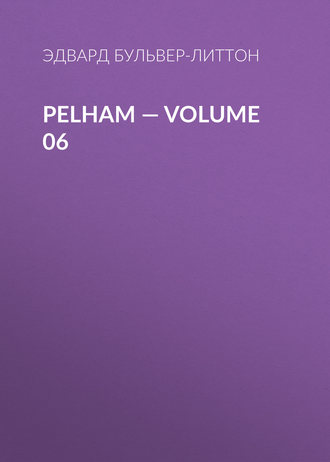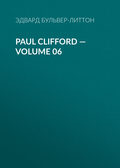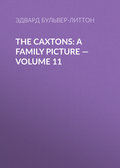
Эдвард Бульвер-Литтон
Pelham — Volume 06
One does not keep company with men of two virtues, and receive compliments upon one's common sense for nothing!
The beggar still continued to importune me. "Give him some food and half a crown," said I, to my landlady. Two hours afterwards, she came up to me—"Oh, Sir! my silver tea-pot—that villain, the beggar!"
A light flashed upon me—"Ah, Mr. Job Jonson! Mr. Job Jonson!" cried I, in an indescribable rage; "out of my sight, woman! out of my sight!" I stopped short; my speech failed me. Never tell me that shame is the companion of guilt—the sinful knave is never so ashamed of himself as is the innocent fool who suffers by him.
CHAPTER LXX
Then must I plunge again into the crowd,
And follow all that peace disdains to seek.
—Byron.
In the quiet of my retreat I remained for eight days—during which time I never looked once at a newspaper—imagine how great was my philosophy! On the ninth, I began to think it high time I should hear from Dawton; and finding that I had eaten two rolls for breakfast, and that my untimely wrinkle began to assume a more mitigated appearance, I bethought me once more of the "Beauties of Babylon."
While I was in this kindly mood towards the great city and its inhabitants, my landlady put two letters in my hand—one was from my mother, the other from Guloseton. I opened the latter first; it ran thus:
"Dear Pelham,
"I was very sorry to hear you had left town—and so unexpectedly too. I obtained your address from Mivart's, and hasten to avail myself of it. Pray come to town immediately, I have received some chevreuil as a present, and long for your opinion; it is too nice to keep: for all things nice were made but to grow bad when nicest; as Moore, I believe, says of flowers, substituting sweet and fleetest, for bad and nicest; so, you see, you must come without loss of time.
"But you, my friend—how can you possibly have been spending your time? I was kept awake all last night, by thinking what you could have for dinner. Fish is out of the question in the country; chickens die of the pip every where but in London; game is out of season; it is impossible to send to Gibblet's for meat; it is equally impossible to get it any where else; and as for the only two natural productions of the country, vegetables and eggs, I need no extraordinary penetration, to be certain, that your cook cannot transmute the latter into an omelette aux huitres, on the former into legumes a la creme.
"Thus, you see, by a series of undeniable demonstrations, you must absolutely be in a state of starvation. At this thought, the tears rush into my eyes: for heaven's sake, for my sake, for your own sake, but above all, for the sake of the chevreuil, hasten to London. I figure you to myself in the last stage of atrophy—airy as a trifle, thin as the ghost of a greyhound.
"I need say no more on the subject. I may rely on your own discretion, to procure me the immediate pleasure of your company. Indeed, were I to dwell longer on your melancholy situation, my feelings would overcome me- -Mais, revenons a nos moutons—(a most pertinent phrase, by the by—oh! the French excel us in every thing, from the paramount science of cookery, to the little art of conversation.)
"You must tell me your candid, your unbiassed, your deliberate opinion of chevreuil. For my part, I should not wonder at the mythology of the northern heathen nations, which places hunting among the chief enjoyments of their heaven, were chevreuil the object of their chace; but nihil est omni parte beatum, it wants fat, my dear Pelham, it wants fat: nor do I see how to remedy this defect; for were we by art to supply the fat, we should deprive ourselves of the flavour bestowed by nature; and this, my dear Pelham, was always my great argument for liberty. Cooped, chained, and confined in cities, and slavery, all things lose the fresh and generous tastes, which it is the peculiar blessing of freedom and the country to afford.
"Tell me, my friend, what has been the late subject of your reflections? My thoughts have dwelt much, and seriously, on the 'terra incognita,' the undiscovered tracts in the pays culinaire, which the profoundest investigators have left untouched and unexplored in veal. But more of this hereafter;—the lightness of a letter, is ill suited to the depths of philosophical research.
"Lord Dawton sounded me upon my votes yesterday. 'A thousand pities too,' said he, 'that you never speak in the House of Lords.' 'Orator fit,' said I—orators are subject to apoplexy.
"Adieu, my dear friend, for friend you are, if the philosopher was right in defining true friendship to consist in liking and disliking the same things. [Seneca.] You hate parsnips au naturel—so do I; you love pates du foie gras, et moi aussi—nous voila les meilleurs amis du monde.
"Guloseton."
So much for my friend, thought I—and now for my mother, opening the maternal epistle, which I herewith transcribe:
"My dear Henry,
"Lose no time in coming to town. Every day the ministers are filling up the minor places, and it requires a great stretch of recollection in a politician, to remember the absent. Mr. V—, said yesterday, at a dinner party, where I was present, that Lord Dawton had promised him the Borough of—. Now you know, my dear Henry, that was the very borough he promised to you: you must see further into this; Lord Dawton, is a good sort of man enough, but refused once to fight a duel; therefore, if he has disregarded his honour in one instance, he may do so in another: at all events, you have no time to lose.
"The young Duke of—gives a ball tomorrow evening: Mrs.—pays all the expenses, and I know for a certainty that she will marry him in a week; this as yet is a secret. There will be a great mixture, but the ball will be worth going to: I have a card for you.
"Lady Huffemall and I think that we shall not patronize the future duchess; but have not yet made up our minds. Lady Roseville, however, speaks of the intended match with great respect, and says that since we admit convenance, as the chief rule in matrimony, she never remembers an instance in which it has been more consulted.
"There are to be several promotions in the peerage. Lord H—'s friends wish to give out that he will have a dukedom; Mais j'en doute. However, he has well deserved it; for he not only gives the best dinners in town, but the best account of them, in the Morning Post, afterwards; which I think is very properly upholding the dignity of our order.
"I hope most earnestly that you do not (in your country retreat) neglect your health; nor, I may add, your mind; and that you take an opportunity every other day of practising waltzing, which you can very well do, with the help of an arm-chair. I would send you down (did I not expect you here so soon) Lord Mount E—'s Musical Reminiscences; not only because it is a very entertaining book; but because I wish you to pay much greater attention to music than you seem inclined to do. T. H—who is never very refined in his bon mots, says, that Lord M. seems to have considered the world a concert, in which the best performer plays first fiddle. It is, indeed, quite delightful to see the veneration our musical friend has for the orchestra and its occupants. I wish to heaven, my dear Henry, he could instil into you a little of his ardour. I am quite mortified at times by your ignorance of tunes and operas: nothing tells better in conversation, than a knowledge of music, as you will one day or other discover.
"God bless you, my dearest Henry. Fully expecting you, I have sent to engage your former rooms at Mivart's; do not let me be disappointed.
"Yours,"F. P."
I read the above letter twice over, and felt my cheek glow and my heart swell as I passed the passage relative to Lord Dawton and the borough. The new minister had certainly, for some weeks since, been playing a double part with me; it would long ago have been easy to procure me a subordinate situation—still easier to place me in parliament; yet he had contented himself with doubtful promises and idle civilities. What, however, seemed to me most unaccountable was, his motive in breaking or paltering with his engagement; he knew that I had served him and his party better than half his corps; he professed, not only to me, but to society, the highest opinion of my abilities, knowledge, and application. He saw, consequently, how serviceable I could be as a friend; and from the same qualities, joined to the rank of my birth and connections, and the high and resentful temper of my mind, he might readily augur that I could be equally influential as a foe.
With this reflection, I stilled the beating of my heart, and the fever of my pulse. I crushed the obnoxious letter in my hand, walked thrice up and down my room, paused at the bell—rung it violently—ordered post horses instantly, and in less than an hour was on the road to London.
How different is the human mind, according to the difference of place. In our passions, as in our creeds, we are the mere dependents of geographical situation. Nay, the trifling variation of a single mile will revolutionize the whole tides and torrents of our hearts. The man who is meek, generous, benevolent, and kind in the country, enters the scene of contest, and becomes forthwith fiery or mean, selfish or stern, just as if the virtues were only for solitude, and the vices for the city. I have ill expressed the above reflection; n'importe—so much the better shall I explain my feelings at the time I speak of—for I was then too eager and engrossed to attend to the niceties of words. On my arrival at Mivart's, I scarcely allowed myself time to change my dress before I set out to Lord Dawton. He shall afford me an explanation, I thought, or a recompence, or a revenge. I knocked at the door—the minister was out. "Give him this card," said I, haughtily, to the porter, "and say I shall call to-morrow at three."
I walked to Brookes's—there I met Mr. V—. My acquaintance with him was small, but he was a man of talent, and, what was more to my purpose, of open manners. I went up to him, and we entered into conversation. "Is it true," said I; "that I am to congratulate you upon the certainty of your return for Lord Dawton's borough of—?"
"I believe so," replied V—. "Lord Dawton engaged it to me last week, and Mr. H—, the present member, has accepted the Chiltern Hundreds. You know all our family support Lord Dawton warmly on the present crisis, and my return for this borough was materially insisted upon." Such things are, you see, Mr. Pelham, even in these virtuous days of parliamentary purity."
"True," said I, dissembling my chagrin, "yourself and Dawton have made an admirable exchange. Think you the ministry can be said to be fairly seated?"
"By no means; every thing depends upon the motion of—, brought on next week. Dawton looks to that as to the decisive battle for this session."
Lord Gavelton now joined us, and I sauntered away with the utmost (seeming) indifference. At the top of St. James's-street, Lady Roseville's well known carriage passed me—she stopped for a moment. "We shall meet at the Duke of—'s to-night," said she, "shall we not?"
"If you go—certainly," I replied.
I went home to my solitary apartment, and if I suffered somewhat of the torments of baffled hope and foiled ambition, the pang is not for the spectator. My lighter moments are for the world—my deeper for myself; and, like the Spartan boy, I would keep, even in the pangs of death, a mantle over the teeth and fangs which are fastening upon my breast.
CHAPTER LXXI
Nocet empta dolore voluptas.
—Ovid.
The FIRST person I saw at the Duke of—'s was Mr. Mivart—he officiated as gentleman usher: the SECOND was my mother—she was, as usual, surrounded by men, "the shades of heroes that have been," remnants of a former day, when the feet of the young and fair Lady Frances were as light as her head, and she might have rivalled in the science de la danse, even the graceful Duchess of B—d. Over the dandies of her own time she still preserved her ancient empire; and it was amusing enough to hear the address of the ci-devant jeunes hommes, who continued, through habit, the compliments began thirty years since, through admiration.
My mother was, indeed, what the world calls a very charming, agreeable woman. Few persons were more popular in society; her manners were perfection—her smile enchantment; she lived, moved, breathed, only for the world, and the world was not ungrateful for the constancy of her devotion. Yet, if her letters have given my readers any idea of her character, they will perceive that the very desire of supremacy in ton, gave (God forgive my filial impiety!) a sort of demi-vulgarism to her ideas; for they who live wholly for the opinion of others, always want that self-dignity which alone confers a high cast to the sentiments; and the most really unexceptionable in mode, are frequently the least genuinely patrician in mind.
I joined the maternal party, and Lady Frances soon took an opportunity of whispering, "You are looking very well, and very handsome; I declare you are not unlike me, especially about the eyes. I have just heard that Miss Glanville will be a great heiress, for poor Sir Reginald cannot live much longer. She is here to-night; pray do not lose the opportunity."
My cheek burnt like fire at this speech, and my mother, quietly observing that I had a beautiful colour, and ought therefore immediately to find out Miss Glanville, lest it should vanish by the least delay, turned from me to speak of a public breakfast about shortly to be given. I passed into the dancing-room; there I found Vincent; he was in unusually good spirits.
"Well," said he, with a sneer, "you have not taken your seat yet. I suppose Lord Dawton's representative, whose place you are to supply, is like Theseus, sedet eternumque sedebit. A thousand pities you can't come in before next week; we shall then have fiery motions in the Lower House, as the astrologers say."
I smiled. "Ah, mon cher!" said I, "Sparta hath many a worthier son than me! Meanwhile, how get on the noble Lords Lesborough and Lincoln? 'sure such a pair were never seen, so justly formed to meet by nature!'"
"Pooh!" said Vincent, coarsely, "they shall get on well enough, before you get in. Look to yourself, and remember that 'Caesar plays the ingrate.'"
Vincent turned away; my eyes were rivetted on the ground; the beautiful Lady—passed by me; "What, you in a reverie?" said she, laughing; "our very host will turn thoughtful next!"
"Nay," said I, "in your absence would you have me glad? However, if Moore's mythology be true—Beauty loves Folly the better for borrowing something from Reason; but, come, this is a place not for the grave, but the giddy. Let us join the waltzers."
"I am engaged."
"I know it! do you think I would dance with any woman who was not engaged?—there would be no triumph to one's vanity in that case. Allons, ma belle, you must prefer me to an engagement;" and so saying, I led off my prize.
Her intended partner was Mr. V—; just as we had joined the dancers, he spied us out, and approached with his long, serious, respectful face; the music struck up, and the next moment poor V. was very nearly struck down. Fraught with the most political spite, I whirled up against him; apologized with my blandest smile, and left him wiping his mouth, and rubbing his shoulder, the most forlorn picture of Hope in adversity, that can possibly be conceived.
I soon grew wearied of my partner, and leaving her to fate, rambled into another room. There, seated alone, was Lady Roseville. I placed myself beside her; there was a sort of freemasonry between her and myself; each knew something more of the other than the world did, and we read his or her heart, by other signs than words. I soon saw that she was in no mirthful mood; so much the better—she was the fitter companion for a baffled aspirant like me.
The room we were in was almost deserted, and finding ourselves uninterrupted, the stream of our conversation flowed into sentiment.
"How little," said Lady Roseville, "can the crowd know of the individuals who compose it. As the most opposite colours may be blended into one, and so lose their individual hues, and be classed under a single name, so every one here will go home, and speak of the 'gay scene,' without thinking for a moment how many breaking hearts may have composed it."
"I have often thought," said I, "how harsh we are in our judgments of others—how often we accuse those persons of being worldly, who merely seem so to the world; who, for instance, that saw you in your brightest moments, would ever suppose that you could make the confession you have just made?"
"I would not make such a confession to many beside yourself," answered Lady Roseville; "nay, you need not thank me. I am some years older than you; I have lived longer in the world; I have seen much of its various characters; and my experience has taught me to penetrate and prize a character like yours. While you seem frivolous to the superficial, I know you to have a mind not only capable of the most solid and important affairs, but habituated by reflection to consider them. You appear effeminate, I know that none are more daring—indolent, none are more actively ambitious—utterly selfish, and I know that no earthly interest could bribe you into meanness or injustice—no, nor even into a venial dereliction of principle. It is from this estimate of your character, that I am frank and open to you. Besides, I recognize something in the careful pride with which you conceal your higher and deeper feelings, resembling the strongest actuating principle in my own mind. All this interests me warmly in your fate; may it be as bright as my presentiments forebode."
I looked into the beautiful face of the speaker as she concluded; perhaps, at that solitary moment, my heart was unfaithful to Ellen; but the infidelity passed away like the breath from the mirror. Coxcomb as I was, I knew well how passionless was the interest expressed for me. Libertine as I had been, I knew, also, how pure may be the friendship of a woman, provided she loves another.
I thanked Lady Roseville, warmly, for her opinion, "Perhaps," I added, "dared I solicit your advice, you would not find me wholly undeserving of your esteem."
"My advice," answered Lady Roseville, "would be, indeed, worse than useless, were it not regulated by a certain knowledge which, perhaps, you do not possess. You seem surprised. Eh bien; listen to me—are you not in no small degree lie with Lord Dawton?—do you not expect something from him worthy of your rank and merit?"
"You do, indeed, surprise me," said I. "However close my connection with Lord Dawton may be, I thought it much more secret than it appears to be. However, I own that I have a right to expect from Lord Dawton, not, perhaps, a recompense of service, but, at least, a fulfilment of promises. In this expectation I begin to believe I shall be deceived."
"You will!" answered Lady Roseville. "Bend your head lower—the walls have ears. You have a friend, an unwearied and earnest friend, with those now in power; directly he heard that Mr. V—was promised the borough, which he knew had been long engaged to you, he went straight to Lord Dawton. He found him with Lord Clandonald; however, he opened the matter immediately. He spoke with great warmth of your claims—he did more—he incorporated them with his own, which are of no mean order, and asked no other recompense for himself than the fulfilment of a long made promise to you. Dawton was greatly confused, and Lord Clandonald replied, for him, that certainly there was no denying your talents—that they were very great—that you had, unquestionably, been of much service to their party, and that, consequently, it must be politic to attach you to their interests; but that there was a certain fierte, and assumption, and he might say (mark the climax) independence about you, which could not but be highly displeasing in one so young; moreover, that it was impossible to trust to you—that you pledged yourself to no party—that you spoke only of conditions and terms—that you treated the proposal of placing you in parliament rather as a matter of favour on your part, than on Lord Dawton's—and, in a word, that there was no relying upon you. Lord Dawton then took courage, and chimed in with a long panegyric on V—, and a long account of what was due to him, and to the zeal of his family, adding, that in a crisis like this, it was absolutely necessary to engage a certain, rather than a doubtful and undecided support; that, for his part, if he placed you in parliament, he thought you quite as likely to prove a foe as a friend; that, owing to the marriage of your uncle, your expectations were by no means commensurate with your presumption, and that the same talents which made your claims to favour, as an ally, created also no small danger in placing you in any situation where you could become hurtful as an enemy. All this, and much more to the same purpose, was strenuously insisted upon by the worthy pair; and your friend was obliged to take his leave, perfectly convinced that, unless you assumed a more complaisant bearing, or gave a more decided pledge, to the new minister, it was hopeless for you to expect any thing from him, at least, for the present. The fact is, he stands too much in awe of you, and would rather keep you out of the House than contribute an iota towards obtaining you a seat. Upon all this, you may rely as certain."







